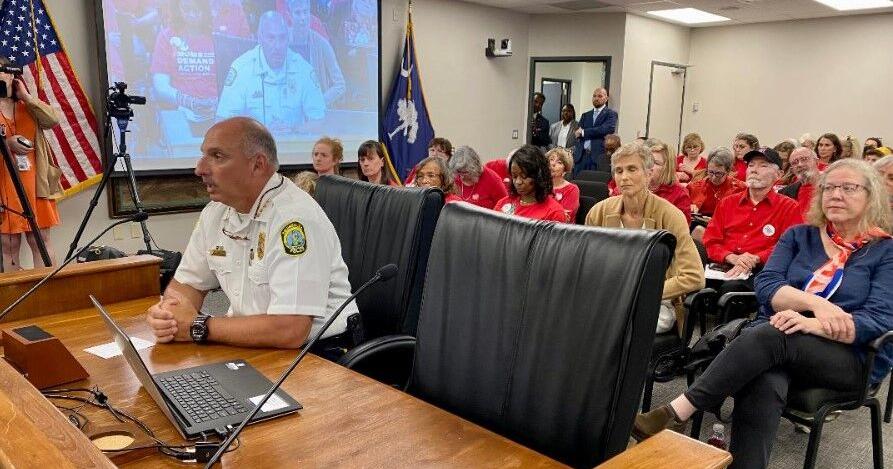COLUMBIA — Republican senators advanced legislation allowing adults in South Carolina to legally tote a handgun with no training required despite objections it will increase both accidental and intentional shootings.
A 3-2 vote April 5 along party lines sent the measure to the full Senate Judiciary Committee, with supporters acknowledging it still needs work.
The movement came after hours of testimony, mostly from opponents who packed the hearing, including police chiefs, students, and moms.
Advocates in the audience were limited to lobbyists for the National Rifle Association and Palmetto Gun Rights, which calls itself the state’s only no-compromise group for “100 percent firearms liberty.”
The bill, which passed the House in February, would allow anyone 18 and older who can legally buy a gun to carry it around, whether openly or concealed, without needing a permit. Twenty-six states already have similar laws, with Florida being the latest added this week.
It’s on a path to passage in South Carolina two years after the Legislature approved a law letting gun owners who hold a concealed weapon permit carry it openly if they want. The permitting process, overseen by the State Law Enforcement Division, involves training and fingerprinting. It also requires the gun owner to be at least 21.
Supporters of so-called “constitutional carry” argued permit requirements only affect law-abiding gun owners, since criminals will carry around a gun regardless.
“We believe you should not need a government permission slip to carry a gun,” said D.J. Spiker, state director for the NRA, while adding the CWP program should remain an option. “Certainly, we think training is absolutely important.”
Opponents of the bill said the training must be mandated for the safety of both the public and gun owners themselves.
“In law enforcement, we train, train and train some more, and we still make mistakes,” said Myrtle Beach Police Chief Amy Prock.
In shootings, “we’ve seen law enforcement officers put in that position who freeze up,” said Anderson Police Chief Jim Stewart. “I’d hate to see someone with no training whatsoever, period, where their own weapon is used against them.”
Columbia Police Chief Skip Holbrook, president of the South Carolina Law Enforcement Officers Association, told senators he knows of no police chief in the state who supports permitless carry.
It was the first hearing this year where law enforcement officers showed up to publicly object.
Previous proposals failed partly due to the vocal opposition from State Law Enforcement Division Chief Mark Keel and the state Sheriff’s Association. But they were silent on the idea as the bill moved through the House. What kept them neutral this time was a section creating a felon-in-possession crime they’ve argued for years is needed to combat violent crime.
The compromise section, as passed by the House, aligns state law to what’s already illegal through federal law, enabling state and local officers to charge more people who shouldn’t own a gun.
“We’re dependent on our federal partners for enforcement, and they rarely take up those cases,” Jarrod Bruder, director of the state Sheriffs’ Association, said to the Senate panel. “We are absolutely looking for some ability to address those unlawfully in possession of firearms already.”
Senators voted to remove the section entirely.
Sen. Wes Climer of Rock Hill, the panel’s chairman, pledged to reinsert it in full Judiciary Committee with an amended version that accomplishes what officers want with more specific wording.
Bruder stressed his group opposes the bill without that section. The elimination not only fails to provide officers the tool they’ve sought for years amid a rise in murders, it makes permitless carry extremely concerning, he said.
As per a federal court ruling, officers in states that don’t require permits must treat everyone they encounter as carrying a handgun legally. They can’t question someone for carrying a handgun, making it easier for criminals to tote a gun illegally without fear of getting arrested, he said.
“That will fundamentally change how law enforcement interacts with people with firearms,” Bruder said. “We’ll have no way of knowing who is or isn’t lawful. That’s why we’re hoping to get (the felon-in-possession section) or something like it.”
Mark Price of Columbia, a CWP instructor, noted the required training includes a detailed explanation of state law, to include when a shooting is a justified defense.
In South Carolina, “you have to have a license to cut a dog’s hair. To cut somebody’s toenails, you’ve got to have a license,” he said, adding a roughly eight-hour course on gun safety can save lives.
With a CWP, “you’re basically saying ‘I’ve taken the lesson. I’ve met the requirements. I know where I can and can’t carry,'” he continued. “There’s no such thing as an accidental shooting. It’s because the person didn’t follow the safety rules. Uneducated people make uneducated decisions.”




